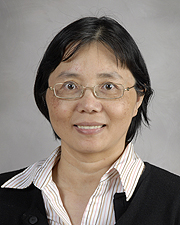
Shao-Qing Kuang, MD, PhD
- Assistant Professor, Medical Genetics
- Medical Genetics
Biography
Shao-Qing Kuang is Assistant Professor of the Department of Internal Medicine at University of Texas Health Science Center, Houston. She received her B.S degree in Medicine from Jiang Xi Medical College, China and her M.S. and Ph.D. in Internal Medicine from Shanghai Second Medical University, China. After several years as Post Doc at the University of Texas Health Science Center and Baylor College of Medicine, she served as instructor and then assistant professor in the Department of Leukemia, University of Texas M.D. Anderson Cancer Center, Houston. In 2009, Dr. Kuang joined Dr. Milewicz’s lab at the division of Medical Genetics, University of Texas Health Science Center at Houston. Her current research involves investigation of the molecular mechanisms in mutant smooth muscle contractile proteins: pathways to vascular diseases. Specifically, the genetically modified mouse models of ACTA2 (encoding α-actin) and MYH11 (encoding myosin heavy chain) mutations will be characterized for thoracic aortic aneurysm formation and neointimal formation following vascular injury, and the phenotype of explanted aortic smooth muscles cells characterized. Analysis of the cellular and pathologic changes associated with aortic and occlusive vascular diseases will be performed and the role of pathways driving these pathologies determined.
Dr. Kuang has been working in the studies of genetics and molecular biology of human diseases for over 10 years. She carried out genetic studies of a novel autosomal dominant bleeding disorder and Familial thoracic aneurysms and dissections with both candidate gene approach and genome-wide genetic screen methods in recent years. She expanded her research to include generation and characterization of AIB3/PRIP knockout mice, studying the roles of AIB1/SRC3 in mammary gland development and breast cancer, and studying the usefulness of methylation biomarkers as well as the hypomethylating agents in leukemias diagnosis and treatment. She identified hundreds of novel differentially methylated genes and studied the differential tumor suppressor properties and transforming growth factor-b responsiveness of p57KIP2 in leukemia cells. Her current studies focus on the generation, identification and characterization of genetically altered mouse models. Recently, she carried the genetic copy number variation analysis and identified the “Recurrent Chromosome 16p13.1 Duplications Are a Risk Factor for Aortic Dissections”. She also generated a Myh11 R247C knock-in mouse model and identified a “Rare, Non-Synonymous Variant in the Smooth Muscle-Specific Isoform of Myosin Heavy Chain, MYH11, R247C, Alters Force Generation in the Aorta and Phenotype of Smooth Muscle Cells”. These two papers were published in “Plos Genetics” and “Circulation Research” in 2002.
Education
- Medical Degree
- Jiang Xi Medical College, Nanchang, 330006, P.R. China
- M.S.
- Shanghai Second Medical University, Shanghai, 200025, P.R. China
- Doctorate Degree
- Shanghai Second Medical University, Shanghai, 200025, P.R. China
- Fellowship
- Division of Endocrinology, Department of Medicine, Baylor College of Medicine, Houston, TX
- Fellowship
- Division of Medical Genetics, Department of Medicine, University of Texas Houston Medical School, Houston
- Fellowship
- Department of Molecular and Cellular Biology, Baylor College of Medicine, Houston